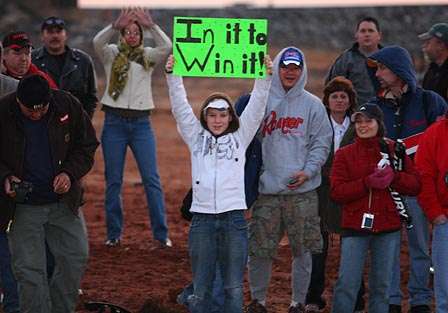
ANDERSON, S.C. — The gangplank to the blast-off dock was frost-slick on the final morning of the Bassmaster Classic, with red clay footprints mashed into the white ice. Slide right up to the water, and there in his boat was Kevin Short, bundled in a thick scarlet coat, a pink beanie pulled over his ears.
He was about to begin Day Three in 19th place — a little more than 11 pounds behind leader Alton Jones, effectively out of contention. But it would have been hard to find a man more geeked to go hunt bass on a cold Sunday morning.
"Everybody who came here this week?" he said. "All 50 of them wanted to be standing right here, right now.
"Let's roll. Cut everything off. Start all over again. And let's go. See what happens."
Without any tour points at stake, the Classic is considered a win-or-nothing tournament. That's the attitude that led Kelly Jordon to roll into a weigh-in without a fish, as he did on Day Two. He knew he needed more than five small fish to contend for the top spot. So he went for big ones, and caught squat.
He and 24 other anglers missed the Classic's only cut. Twelve hours later on Lake Hartwell, 25 anglers launched with one final chance to capture the trophy and the cool half-million greenbacks that come with a Classic victory.
But only about six of them had a realistic chance at running down Jones: Charlie Hartley, Cliff Pace, Kevin VanDam, Jeff Kriet, Michael Iaconelli and maybe even Greg Hackney, who sat 5 pounds, 5 ounces off the lead. The record Classic deficit overcome was Rick Clunn's 9-0 assassin job to catch Tommy Biffle in 1990. Only four times in 37 Classics has the winner come back more than 5 pounds on the final day.
So what does the rest of the pack fish for? Pride, placement and a few grand. In the Classic, 50th through 26th place all pay $10,000. The 25th place finisher pockets $12,000, and the pay scale inflates gradually to $13,000 for 16th and $15,000 for 11th. From there, the dough makes a nice jump to $20,000 for 10th.
Nothing to sneeze at, maybe, but peanuts compared to the top prize. And, to hear Short tell it, all worth less than the stage itself.
"I think the biggest advantage is being above 26 and being here the last day," he said.
"Because there's a helluva lot of people that'll be here, that will be watching. That's probably worth more than money — just the exposure. That's huge."
There's also the possibility, however remote, that a miracle happens. John Crews (16th place) said he intends to catch a 28-pound sack to overcome his 10-3 deficit. "Records are made to be broken," he said.
Even if the impossible doesn't happen, Crews said he can take solace in having improved over the course of the tournament. None other than Clunn once told him that learning during a tournament helps define success. Finishing 10th after being in 1st, for instance, makes for a terrible tournament. But clawing up to 10th from 70th is a different story.
"I'm glad that I figured out a little something yesterday, and if that deal works today, then I'll be really happy for figuring out a different pattern during the tournament," Crews said.
Casey Ashley seemed aligned with that philosophy. He fell to 20th from a tie for 5th after Day Two. He was resigned to shooting for a top 10 finish.
Ditto was Skeet Reese (13th). "I'm pretty much out of it," he said. "I think the best I could do is maybe back into a top 5 finish."
And then there was Short, sitting further back than those fellows, testing the power of positive thinking.
"You can't have 'no' in your heart," Short said. "You don't know, man. It's fishing. There's some big damn fish out there."
